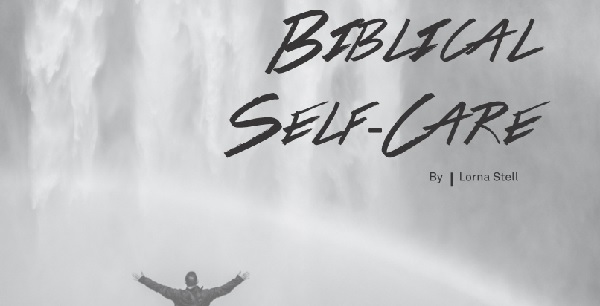Biblical Self-Care
By Lorna Stell

Despite living in a society where we are led to believe we are most deserving of love, respect, and success when we work harder and do more, I believe we hold inherent value and worth, regardless of how others treat us, or even what we may believe about ourselves. Therefore, I also believe in the importance of intentionally caring for ourselves, because we matter. In practice, this is called self-care—consistently choosing to nourish all parts of ourselves, because we are valuable.
Self-care has significantly changed my life for the better where nothing else has. Over a decade ago I developed chronic urticaria and chronic fatigue, to the point where it impacted my daily life and the possibility of having an independent and successful future. The majority of doctors could not help me, and spiritual healers made no difference at the time either. However, I still held big aspirations for my life story. Eventually, having the hunch that physical, mental, emotional, and spiritual health are all connected, I decided to try something new (and scary to me, at the time): counseling. Through counseling I discovered many areas where healing was actually very accessible to me, but required self-awareness and intentionally choosing compassion and self-care. Today, my health has improved immensely. I now live in an urban area, travel regularly, am married, and own a business—all things I didn’t think would be possible for me just a few years ago. Whether you can relate to my story or not, I believe self-care is important for you too.
Despite Scripture demonstrating this same perspective, I have yet to see the value of self-care acknowledged in the Christian community, even though in my experience, the Church is a place where there is an enormous need for encouragement towards self-care. If you have ever felt obligated to attend events out of guilt or perform acts of service despite exhaustion, or felt ashamed because there is always something keeping you from being a “good enough Christian,” then perhaps you can relate. Today, it is my strong desire to share with you the concept of self-care, its importance for each of us, and what it looks like on a practical level in our daily lives.
I strongly believe that in order for us to best steward the life we've been given, we must care for every part of ourselves. After meditating on Scripture, I believe God feels the same way. We can be sure God sees inherent worth in us and be self-assured in this. Luke 12:6-7 teaches, “Are not five sparrows sold for two pennies? And not one of them is forgotten before God. Why, even the hairs of your head are all numbered. Fear not; you are of more value than many sparrows.” Our struggle comes, however, when we revert back to measuring our worth according to human standards—by how much we do or how much others like us—rather than trusting in Christ. When we do not intentionally pause to care for ourselves, believing that it is a waste of time, we mistakenly try to serve others from a glass nearly empty, dragging others down with us when we are not the healthiest version of ourselves we’re able to be. We then set a poor example for our loved ones when we believe we are unworthy of self-care. Truthfully, we have received our worth already from Christ. The only things that hold us back from embracing this fact are ourselves and our own beliefs.
However, sometimes choosing self-care in a productivity- and accomplishment-driven world is a difficult decision to make. It means checking pride at the door and choosing self-care over something else. It becomes easier to envision making this choice, however, when we break it down to what self-care looks like in each aspect of ourselves, and what practical steps we can take to incorporate it. I encourage you to get creative and find what works for you in each area.
Physical Health
Let's begin with the body, the vehicle for everything we do in life. One verse many of us are familiar with, 1 Corinthians 6:19-20, teaches, “Do you not know that your body is a temple of the Holy Spirit, who is in you, whom you have received from God? You are not your own; you were bought at a price. Therefore honor God with your body.” The better we care for our bodies, the better we honor Christ’s sacrifice, and the better we're able to serve others when we have more energy to sustain us. The very act of choosing to care for our physical selves is cause for celebration and remembrance of God's creativity and love for us. As Paul says in Romans 12:1, “I appeal to you therefore, brothers, by the mercies of God, to present your bodies as a living sacrifice, holy and acceptable to God, which is your spiritual worship.”
So what does this look like? Caring for the body includes many things, but we can start by considering where we currently are in our sleep, hydration, nutrition, hygiene, exercise, self-image, and treatment of medical conditions. I suggest considering these areas one at a time and thinking about the following: if I choose to improve any of these areas, which would make the biggest impact in my quality of life right now?
Find a quiet space and carve out ten to fifteen minutes of undisturbed time. You may choose to sit or stand, however you feel most centered and grounded. Get curious and observe: How does your body feel? What parts of you have been most neglected or unrecognized for their worth? What things has your body allowed you to do with your time on earth? Start from your toes and work your attention upwards through each part to your head. Spend time with the Lord sharing what you think and feel about the body you've been given. If this is difficult, know that this is okay and there is nothing wrong with you, but it is also still possible to love, appreciate, and feel thankful for the body you have. If there are areas that feel heavy, tight, tired, etc., know that by leaning on the support of Christ and your loved ones, change in a healthy direction is possible. It starts with intention!
Mental/Emotional Health
A counterintuitive but crucial way for us to care for our bodies is to care for our mental and emotional health. When we come under stress that is not relieved in a healthy way, it is stored in our bodies as muscle tension, or chronic physical problems like general pain or fatigue. Begin to be mindful of your emotional life and thought life. How do you speak to yourself? As Proverbs 16:24 demonstrates, “Gracious words are a honeycomb, sweet to the soul and healing to the bones.” Do you spend more time dwelling on the past or worrying about the future? Commit to being here now, in the present, trusting the Lord with the rest. Remember the words of Philippians 4:6-7: “Be anxious for nothing, but in everything by prayer and supplication with thanksgiving let your requests be made known to God. And the peace of God, which surpasses all comprehension, will guard your hearts and your minds in Christ Jesus.”
John 14:27 says “[...] Do not let your heart be troubled, nor let it be fearful,” but we all know this is often easier said than done! It is one thing to try to command our hearts in what to do, and another to have an attitude of compassion and curiosity towards the source of our troubled, fearful hearts. For example, rather than deciding, “I should not feel fear right now and it’s childish of me to be afraid,” acknowledge that your fear comes from an honest place which is up to you to discover. In choosing self-judgment over curiosity about the source of your fear, your fear lingers without being resolved. Healing comes with clarity. What you often think about becomes what fills your vision—be aware of what thoughts you frequently have. In times when you would benefit from shifting your focus, consider meditation, journaling, counseling or therapy, some tools in service to your self-care.
When you notice thoughts or feelings with a negative focus, give yourself 5 to 10 minutes to get curious and find the source. To do this, I suggest writing out everything that comes to mind in a journal (or writing to God in a prayer journal), talking through it with a trusted friend, or finding a quiet space free of distractions where you can walk or move and think through what you are experiencing. Ask yourself: “What belief does this thought or feeling stem from?” If you are searching but cannot find it right away, allow yourself some grace. As we find more “sore” places where we feel stuck, ashamed, or otherwise negative, it can be tempting to feel defeated or hopeless. But, remember in these times that it means this is an area Christ would bring into our awareness for healing. With new awareness comes new opportunities to lean on the Lord and to allow him to refine us as we journey towards healthiness.

Spiritual Health
Some of us may come to a place where our physical, mental, and emotional health are all doing well. However, if we neglect our spiritual health or relationship with the Lord, we may still feel worn down. For this reason, I consider rest and intentionally connecting with the Lord important for the health of our soul.
Hebrews 4:9-11 guides us: “There remains, then, a Sabbath-rest for the people of God; for anyone who enters God’s rest also rests from his own work, just as God did from his. Let us, therefore, make every effort to enter that rest, so that no one will fall by following their example of disobedience.” By disregarding opportunities for rest, we can easily drag down our brothers and sisters, encouraging one another towards burning out. And by “rest,” I don't necessarily mean sitting down to binge on our favorite TV show and junk food (our culture's most common image of “downtime”). I mean intentionally carving out “white space” in your schedule, even putting it on your calendar. Fill that time with things that fuel your joy and help you recharge, and invite the Lord to come along. Whether that is taking a walk down streets you never noticed in your neighborhood, doing something creative, or reading a book you've “never had time to read,” allow yourself some rest from the constant influx of information and bids for attention that we often experience in our day-to-day lives.
Our “white space” time can also be spent focused in worship. If you aren't sure how you best connect with God, take some time to try new ways to worship, or even take the Spiritual Temperament quiz from Gary Thomas's book Sacred Pathways (quiz is available for free online). In my own life, I’ve discovered through personal experiences and the Spiritual Temperament quiz that I feel close to God intellectually—that is, Wayne Grudem’s Systematic Theology is one of my favorite Christian books, and I love making new discoveries through the concordance and footnotes in my study Bible. Some other friends of mine feel closest to the Lord in different ways, like time spent in nature, listening to or playing worship music, or partaking in traditions like communion. When you discover how you feel closest to God and choose to spend more time in that activity, this can help your relationship with him grow deeper, which also fosters improved spiritual health.

Conclusion
Throughout this exploration of self-care for us as Christians, I thought it important to include prompts for how to incorporate it into your daily life. Self-care can be a nice thing to think about, but it means nothing without action and intention. When introducing a new perspective to our lives, it can be easy to quickly give up or feel discouraged when we face challenges. Having experienced this difficulty myself, I want to encourage you with a few guidelines.
First, get curious. Curiosity is a neutral state (not labeling anything as good or bad) that often serves us well when learning something new. It is simply a desire to learn and explore. When you discover a new physical feeling, emotion, or thought, choose to get curious about it without passing judgment.
Second, test and change. When you discover an area in your life that you believe would help you become healthier were it to shift in some way, approach it from a “test and change” mentality. Try a new way of approaching this area of life. If you find the new way doesn't feel quite right, you have the freedom to change it rather than declaring you’ve failed. Instead of being stuck in stagnant living and believing that the way life is for us now is how it always will be, “test and change” allows us to expand our perspective in ways we never previously thought possible.
Lastly, you have permission to refrain from self-judgment. While we have many scriptures that teach us how to live, the truth is that none of us changes (for better or for worse) overnight. As Christ extends to us his grace, it's essential we do the same for ourselves—otherwise, we never truly believe in his grace because we believe we’re undeserving. Expending your energy on judging yourself does not serve you, but opening yourself up to compassion and bringing your concerns to Christ does.
In all of this, know that intention is the key to growth and change in our lives. If we say we want to be healthy and honor God with our lives, but we choose not to care for ourselves, we can be sure our priorities are elsewhere. Self-care is a choice. Not always an easy one to make, but always an important one. “Jesus replied: ‘Love the Lord your God with all your heart and with all your soul and with all your mind.’ This is the first and greatest commandment. And the second is like it: ‘Love your neighbor as yourself ’” (Matthew 22:37-39, writer’s emphasis added).


 Lorna Stell is a portrait and wedding photographer with a background in fine and performing arts. She was raised in the evangelical culture of Southwest Virginia, and today lives with her husband just outside Boston, Massachusetts. Lorna can often be found in front of an Apple computer, on a yoga mat, or curled up with a Brené Brown book.
Lorna Stell is a portrait and wedding photographer with a background in fine and performing arts. She was raised in the evangelical culture of Southwest Virginia, and today lives with her husband just outside Boston, Massachusetts. Lorna can often be found in front of an Apple computer, on a yoga mat, or curled up with a Brené Brown book.